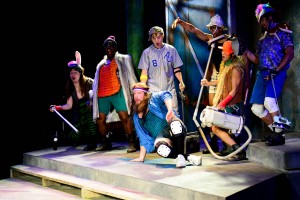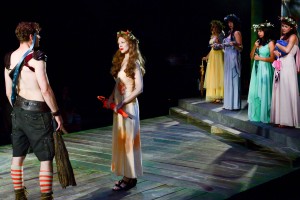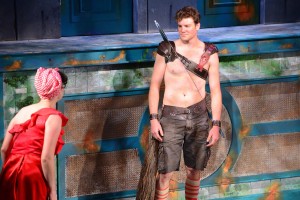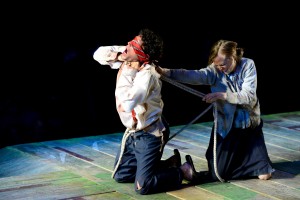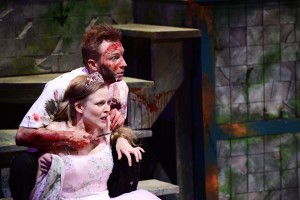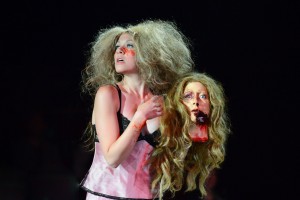A TRAGEDY OF EPIC PROPORTIONS
Writing a play of more than 800 pages that takes twelve hours to perform is both an act of hubris and an act of genius. Written and directed by The Hypocrites’ founder Sean Graney, All Our Tragic distills all 32 surviving Greek tragedies into one nearly seamless narrative. The result is an epic masterpiece that should delight all those who do not suffer from a weak stomach or, perhaps, severe ADHD.
Divided into four parts and eight acts, All Our Tragic is designed for single-day Saturday and Sunday performances lasting from 11 a.m. to 11 p.m. There are plenty of breaks for stretching, smoking, eating (they feed you), and peeing. But it is also possible to see each part separately over a succession of Friday or Monday evenings. Perfectly paced in an endless cycle of tragedy and comedy (yes, it’s funny!), the drama oscillates between violence and intrigue, romance and grief. You will cry and laugh out loud. And if you sit in the front row, you’ll likely get splattered with fake blood.
One of the most extraordinary omissions in Graney’s interpretation of the Greeks is the complete absence of the gods (imagine the Trojan War without Athena). There is still a fair amount of the supernatural (Eurystheus’ necromancy, the Seven Sisters’ youthfulness, Herakles’ Palladian bow), but the emphasis is on the natural’”human nature, to be precise. Graney wisely refrains from moralizing, although he comes very close to doing so during the play’s conclusion. In the words of Klytaimnestra, “All our tragic happens because we love someone we shouldn’t have.” While poor choices in love run throughout the narrative, Graney is less concerned with intentions and motives than with consequences. His characters must suffer the (sometimes tragic) consequences of their own actions; there is no abdication of responsibility. One could even go so far as to say that All Our Tragic is a celebration of human autonomy and free will: that we, not the gods, are responsible for shaping our destinies.
Each part of All Our Tragic is loosely described by a theme (in order): Physics, Politics, Patriotics, and Poetics. Some correspond quite closely to a set of subjects, such as Politics to the Theban plays and Patriotics to the Trojan plays. What draws together the disparate and sometimes conflicting plots of the source material is the lives of the Seven Sisters. Inspired by the Pleiades and the Danaids, their number includes Asterope and Alkestis, Iphigenia and Helen. Only when the latter has died, does the narrative finally draw to a close. Along the way, the various sisters marry powerful men, from kings Aegeus and Oedipus to generals Menelaus and Agamemnon.
One of the many benefits of stringing all of the Greek tragedies together is that of making connections between them. Graney often makes such connections explicit and obvious through judicious selection of source material and through double casting. For example, there is the marriage of Aegeus (Zeke Sulkes) to Alkestis (Lindsay Gavel) that is mirrored in the relationship of Kreon (also played by Zeke Sulkes) to Tiresias (also Lindsay Gavel). In each case, Aegeus/Kreon discovers that he has a son he didn’t know about. They are Theseus (Ryan Bourque) and Haemon (Luce Metrius). There is also the parallel of Herakles/Agemenon (both played by Walter Briggs) bringing home to his jealous wife another woman gained through war.
Graney coaxes solid performances from each of his talented actors, but none of them is truly outstanding. One of the best comic roles is that of Lynceas (uncredited), played like an evil nerd. The only son of Eurystheus, he is slippery enough to evade murder at the hands of the Seven Sisters and marry one of them, Asterope (Erin Barlow). Lindsay Gavel filled some of the most memorable roles of the entire play, including Alkestis, Tiresias, Iphigenia, and Elektra. It was fascinating to watch her transform from the flirty Alkestis into the much wronged, eyes-gouged-out Tiresias and again into the pure, sacrificial victim Iphigenia.
Playing parts loosely modeled on that of a Greek chorus are Odd-Job Alice (Erin Myers), Odd-Job Erdie (Kate Carson-Groner), and Odd-Job Sophie (Lauren Vogel). These incredibly talented young women played a whole host of different instruments, including guitar, banjo, ukulele, mandolin, accordion and violin. They also sang a variety of operatic and folk songs, from the Queen of the Night’s aria in Mozart’s Magic Flute to “The Ballad of John Henry,” which added further layers of meaning and enjoyment to an already complex and overwhelming production.
In order to recapture something of the original round environment of classical Greek theatre, the Hypocrites put the audience on opposite sides of the stage, which runs diagonally across the length of the theatre. Such an arrangement is incredibly effective for two reasons: it allows for ease of movement on and off stage as well as dynamic perspective. Stage Managers Miranda Bennett and Justine B. Palmisano, Sound Designer Kevin O’Donnell, Gore Coordinator Chrystle Morman, Technical Director Rigel Nunez, Props Artisan/Designer Danielle Case, Scenic Designer Tom Burch, Lighting Designer Jared Moore (and no doubt many others) are to be congratulated for the production’s many exciting and unique special effects, from the arrow that strikes Achilles to the disappearance of Medea.
An ambitious production that exceeds expectation (as if it’s possible to even know what to expect of a 12-hour performance!), All Our Tragic is simply unforgettable on so many levels. It’s not really a show or even a play, but an experience, a total immersion into the imaginations of Sean Graney and the Greeks. The end result is that the tragedies of Aeschylus, Sophocles, and Euripides really do become ours: they are all our tragic.
photos by Evan Hanover
All Our Tragic
The Hypocrites
The Den Theatre, 1329-1333 N. Milwaukee Ave.
Sat & Sun at 11:00 am (full day); Mon & Fri at 8:00 pm (in parts)
scheduled to end on October 5, 2014
re-opens for a return engagement June – August, 2015
for scheduling info and tickets, visit www.the-hypocrites.com
